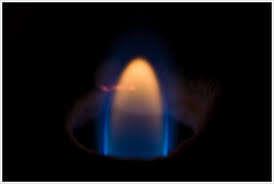
Because I don't like getting my head blown off, I've always avoided pilot lights on gas stoves and such (it's the same reason I avoid fireworks as well), which was a problem when I was a kid because for awhile we had a stove with a finicky light, and I wouldn't help my mother get it back on. (My little brother stepped up to the task.) And I'm not "handy," as they say, and I didn't even know that pilot lights went away about 20 years ago, which is what the guy who came to service my gas furnace told me today. Now they have a ceramic heater that is switched on by electricity, heats up to 1200 °F, which then ignites the flow of gas. Not sure if that'd work for a gas stove where you want a flame immediately, but anyway, he told me it wasn't a safety feature but a change made for efficiency -- it costs $9.50/month for the gas to keep a pilot light lit. I'm don't know if that's now or 20 years ago, but I'm surprised either way, and never realized pilot lights consumed that much gas. My gas bill for January was $42, so that'd be a substantial fraction. For November it was only $13, so a pilot light might have nearly doubled that. Thus does energy efficiency happen.
No comments:
Post a Comment